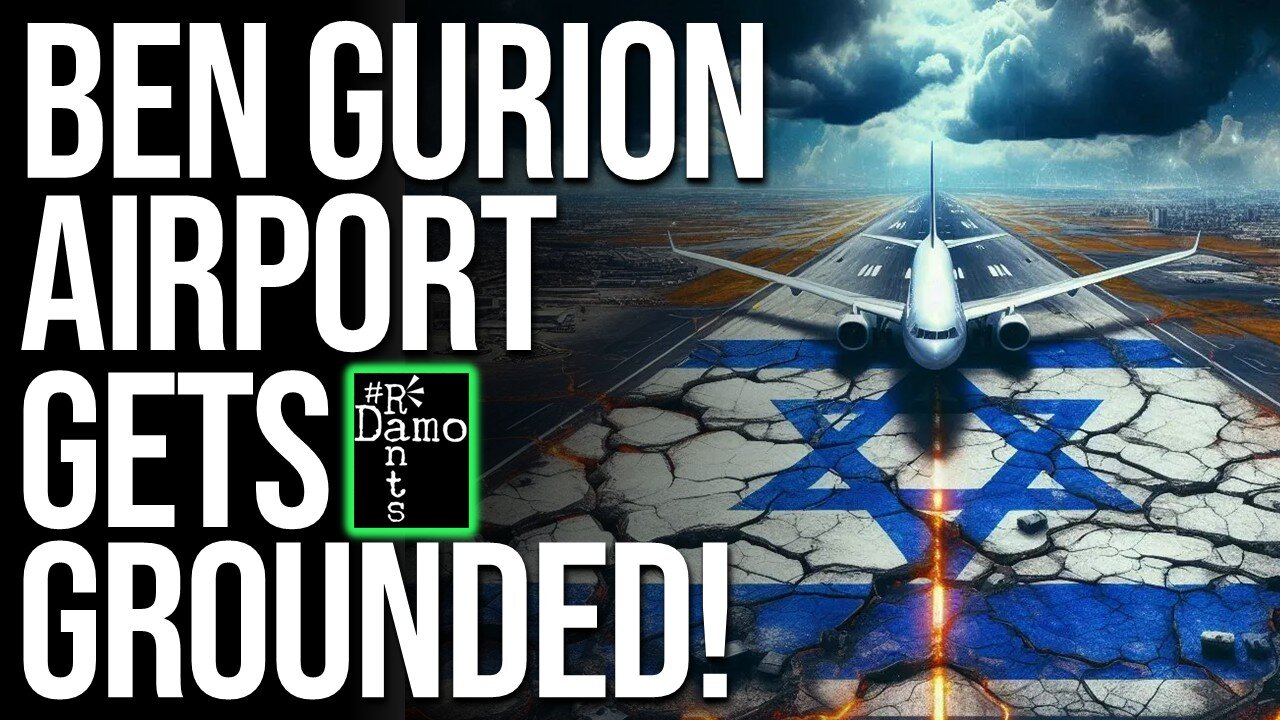Premium Only Content

Israel’s Main Airport Paralysed – And For Once It Wasn’t The Houthis
Right, so the Houthis must be furious. After months of lobbing missiles at Ben Gurion Airport, they’ve finally been upstaged—by overworked baggage handlers armed with nothing more than exhaustion and a refusal to smile at tourists bring them more work anymore. Netanyahu’s government can blame Iran for missiles, Hamas for rockets, and anyone else for everything else, but it can’t spin this one: Israel’s main international gateway has been brought to its knees by its own citizens. No drone strike, no cyberattack—just low wages, long shifts, and a workforce tired of being treated like disposable cogs in a wartime economy. If you want to understand how deeply Netanyahu’s policies are failing, you don’t need to look to Gaza or Tehran; you need only look at the chaos in Terminal 3.
Right, so for months, Israel has been showcasing Ben Gurion International Airport as a symbol of national resilience in the face of external threats. Even as all of those Houthi ballistic missiles targeted Israeli airspace and disrupted regional aviation, the government proudly held up its flagship airport as proof that the country could function under fire. Back in May, when a Houthi missile landed near the airport, causing injuries and forcing airlines to cancel flights, the government claimed a swift restoration of operations as a national victory. The message was clear: no foreign enemy, no matter how determined, could shut down Israel’s main international gateway.
Yet this month Ben Gurion was not brought to its knees by Houthi missiles, Iranian drones, or Hezbollah rockets, but by exhausted and underpaid ground staff who decided they had reached their limit. They had had enough. The airport descended into chaos as baggage handlers and service workers launched what amounted to an “Italian strike”—a coordinated work-to-rule action where staff performed only the bare minimum of their duties. Flights were delayed or cancelled, terminals overflowed with frustrated passengers, and Israel’s carefully cultivated image of wartime stability and resilience was shattered.
Ben Gurion Airport is state owned, so where the Houthis had to expend their missiles to disrupt Ben Gurion’s operations; Netanyahu’s government managed to achieve the same result through chronic underfunding, low wages, and sheer mismanagement. The Israeli government and the Israel Airports Authority (IAA) tried to downplay the crisis as a mere “staff shortage,” but the truth is far more revealing. What unfolded at Ben Gurion is a symptom of a much deeper malaise: a government so consumed by war spending and political survival that it has allowed critical civilian infrastructure to decay.
Ben Gurion Airport has always held a symbolic status in Israel. Beyond its role as the country’s primary international travel hub, it has served as a statement of Israel’s ability to remain connected to the world even in times of war. During previous conflicts, including wars with Gaza and Hezbollah, Ben Gurion rarely ceased operations for long. This resilience became part of Israel’s narrative: while rockets might disrupt daily life in border regions, the capital and its main airport stood firm.
The Houthi attacks in the aftermath of Israel’s invasion of Gaza, very much still ongoing, have disrupted that image but they haven’t destroyed it, not even the strike in May did that. The government have framed this as proof of its strength, even as airlines like Lufthansa, British Airways, and Air France hesitated to resume service for weeks. Reports from The Times of Israel and International Airport Review made clear that international carriers were deeply uneasy, with the Houthis having successfully targeted Israel’s economic lifeline and forced the country into temporary isolation.
By contrast, the slowdown this month was entirely self-inflicted. The government could not blame Tehran or Sanaa for this one; it was a domestic revolt, a product of years of underinvestment in the workforce. What the Houthis had tried to achieve through missile strikes—crippling Israel’s international connectivity—was achieved more effectively by its own citizens with nothing more than luggage carts and a refusal to work overtime.
The official explanation for the crisis was almost laughably simplistic though. The Israel Airports Authority and even the Workers’ Committee publicly described the chaos as the result of “staff shortages,” with no mention of organised protest. The Jerusalem Post reported union leaders insisting that workers were simply “overwhelmed” by peak-season passenger loads.
However, multiple independent outlets told a different story. Reports from Press TV, See.News, and Roya News described the situation as an undeclared strike, with ground staff adopting the classic tactics of an Italian strike. Workers stopped volunteering for overtime, slowed down baggage handling, and adhered strictly to every regulation, knowing full well this would paralyse operations. The Israel Airports Authority eventually issued an apology to travellers, that hinted at the seriousness of the actual disruption, I’m sure that was difficult for them, we all know how hard honesty comes to them.
The government’s insistence on calling this a shortage rather than a strike is intentional. A shortage suggests a temporary logistical issue; a strike would force uncomfortable questions about labour conditions and government policy. But the reality is very clear: this was not simply a matter of too few hands on deck. It was a deliberate act of resistance by workers who feel they have been treated as expendable for too long.
So how badly are the staff being abused?
The first and most obvious cause is exhaustion. Workers are routinely pushed into 12 to 14-hour shifts, often with mandatory overtime. Since the Houthi attacks, security procedures have doubled the workload, and the summer holiday rush has stretched ground staff to breaking point. Several reports highlighted how employees were called in on supposed rest days or pressured to work through illness to keep up with passenger demand. Burnout has become endemic, and morale has collapsed.
The second issue is pay. Ground staff salaries remain barely above Israel’s minimum wage, around 5,300 shekels a month. For this, workers endure gruelling physical labour, lifting heavy luggage in sweltering heat, often with minimal breaks. There is little incentive to stay when supermarket chains or private logistics companies offer higher pay for less physically demanding work.
Third, chronic understaffing is both a cause and consequence of these conditions. Many employees left when drafted into the military reserves after October 2023 and have not returned. While military call-ups explain some of the shortages, and these can be rolling as staff come and go as they get called up, the deeper issue is that these workers have found better opportunities elsewhere and have no desire to come back to an exhausting, low-paid job. Recruitment has failed because the wages and conditions are simply not competitive.
Finally, there is a pervasive sense of disrespect. Workers feel abandoned by management and ignored by the government. The refusal to even acknowledge their action as a strike is itself symbolic of this disregard.
The impact of the slowdown goes far beyond the airport. Israel’s tourism industry, which once accounted for around five percent of GDP, is now on life support. The Gaza genocide caused a collapse in visitor numbers, with 2024 seeing a drop of over 70 percent compared to pre-war levels. The May Houthi missile strike worsened matters, with tens of thousands of tourists stranded and airlines hesitant to resume service.
The July labour crisis compounds this damage. Tourists already worried about security now see Israel’s main airport as unreliable even in the absence of missile attacks. Airlines may decide the risk is simply not worth it, keeping flight frequencies low or pulling out altogether. For a country that relies heavily on international visitors, this is disastrous.
The ripple effects extend into other sectors. Business travel is essential for Israel’s high-tech and defence industries, yet companies are already relocating meetings and staff abroad due to unpredictable flight schedules. According to the New York Post, Israeli tech firms have begun chartering private jets or routing through Cyprus and Greece to bypass Ben Gurion’s instability. Every lost flight further isolates Israel economically, pushing investors and trade partners to reconsider their commitments.
This is also a reputational blow. Israel markets itself as a modern, technologically advanced state, but an airport paralysed by angry baggage handlers paints a very different picture. For international audiences, it suggests a country overstretched and unable to manage basic infrastructure.
At the heart of this crisis is Netanyahu’s wartime economic policy. Since October 2023, military spending has soared to over $4.5 billion a month. While this has been justified as essential for national security, it has come at the expense of public services. The Israel Airports Authority, being state-run, depends on government funding for wage increases and recruitment. But with civilian budgets frozen or cut, there has been no capacity to address the staffing crisis.
This neglect is not unique to Ben Gurion. Nurses, teachers, and municipal workers have all staged protests or threatened strikes over low pay and impossible workloads. But the airport is the most visible sign of these policies backfiring. It is one thing for schools or clinics to suffer; it is quite another for the country’s main international gateway to descend into chaos in full view of the world, especially when the news cycle is so often gazing upon it in light of those Houthi strikes.
The political implications are significant. Netanyahu thrives on external threats; he can rally support by blaming Hamas, Iran, or the Houthis for Israel’s problems. But he cannot shift blame for this crisis. It is entirely domestic and entirely the result of his government’s choices.
The optics are increasingly disastrous as a result. Ordinary Israelis see a government that spends billions on war while leaving critical civilian workers underpaid and overworked. Opposition parties have already seized on the chaos as proof of Netanyahu’s mismanagement, framing it as part of a broader pattern of neglecting the home front. Internationally, Israel’s reputation for efficiency has taken a hit, undermining the very narrative Netanyahu has built to justify his policies.
If this unrest spreads—and there is every reason to think it could—it could inspire other sectors to take similar action. Ben Gurion may prove to be the first crack in a much larger wave of labour resistance.
If the government fails to address the workers’ grievances, the consequences will deepen. Slowdowns may evolve into full-scale strikes, further crippling the airport. Tourism, already devastated, may take years to recover. Airlines might permanently reduce service, leaving Israel semi-isolated. Business travel will continue to decline, weakening key sectors of the economy.
More importantly, this could trigger broader domestic unrest. Public-sector workers across Israel are watching what happens at Ben Gurion. If the government concedes nothing, resentment will grow, and other sectors may follow the airport workers’ lead. This is a dangerous prospect for a government already facing public dissatisfaction over the war and economic decline.
The Ben Gurion crisis is not just about an airport; it is a warning about Israel’s broader trajectory. For all Netanyahu’s talk of resilience, his government has created conditions so intolerable that ordinary workers are the ones crippling the state from within as Netanyahu cripples their existences.
The Houthis may have tried to isolate Israel with missiles, but it was Netanyahu’s own domestic policies—low wages, chronic underfunding, and wartime economic neglect—that is finally grounding Ben Gurion. If the government does not act quickly to fix these systemic problems, this will not remain an isolated incident and more widespread strike action will seem inevitable. Ben Gurion is the canary in the coal mine right now, and if Israel cannot keep its most important civilian hub functioning, the deeper question must be asked: how long before the rest of the country’s civilian infrastructure begins to fail as well, begging the question of what exactly it is that Israel’s military are even fighting for?
This becomes all the more pertinent when you consider that Israel are seeking to seize all of Gaza and annex the West Bank too, essentially eradicating whatever is left of the Palestinian territories, amalgamating it all into Israel. How much more of an economic overstretch is that going to be in light of this, for the sake of simply destroying any remaining notion of a two state solution, even though it should be pretty obvious by now, that Israel have proven that can never, ever come to pass? A one state solution is needed, but it’ll take a South African style approach to Israeli apartheid to bring that about. Get all the details of that story in this video recommendation here as your suggested next watch.
Please do also hit like, share and subscribe if you haven’t done so already so as to ensure you don’t miss out on all new daily content as well as spreading the word and helping to support the channel at the same time which is very much appreciated, holding power to account for ordinary working class people and I will hopefully catch you on the next vid. Cheers folks.
-
 2:04:19
2:04:19
Inverted World Live
4 hours agoJoe Exotic Calls From Prison | Ep. 118
51.5K4 -
 56:24
56:24
DeVory Darkins
12 hours ago $41.91 earnedFederal Judge issues shocking order against Trump as Chicago Mayor pulls insane stunt
105K291 -
 1:43:56
1:43:56
Badlands Media
10 hours agoBaseless Conspiracies Ep. 153
34.4K15 -
 23:51
23:51
Stephen Gardner
3 hours ago🚨Trump did the UNTHINKABLE!
26.7K78 -
 2:54:14
2:54:14
Barry Cunningham
6 hours agoBREAKING NEWS: PRESIDENT TRUMP SAYS HE MAY INVOKE THE INSURRECTION ACT! AND NOW WE KNOW WHY!
32.3K14 -
 40:13
40:13
Clownfish TV
12 hours agoMagic the Gathering Champion BANNED from Tournament Over MAGA Hat?! | Clownfish TV
18.5K19 -
 2:49:47
2:49:47
TimcastIRL
5 hours agoTrump Considers Invoking INSURRECTION ACT To Deploy National Guard to Portland | Timcast IRL
171K83 -
 10:05:38
10:05:38
Dr Disrespect
13 hours ago🔴LIVE - DR DISRESPECT - BLACK OPS 7 - GIVE ME BACK MY NUKE
141K17 -
 LIVE
LIVE
Drew Hernandez
3 hours agoTARGETED LEFTIST TERRORIST ATTACK IN CHICAGO & ISRAEL GEOFENCING U.S. MEGA CHURCHES
995 watching -
 8:58
8:58
Degenerate Jay
14 hours ago $0.63 earnedXbox Game Pass Is Getting Ridiculous
14K2
